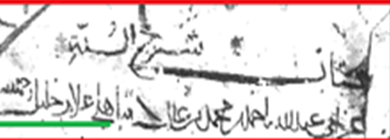Imam ‘Alī al-Qārī (d. 1014 AH) on Tafwīḍ al-Ma’nā (delegation of the meaning) Regarding the Divine Attributes [Ṣifāt]: The Way of the Salaf
In Islamic theological discourse, few topics have generated as much scholarly debate as the proper approach to understanding the divine attributes [ṣifāt] mentioned in the Qur’an and Sunna. The text presented here from Imam ‘Alī al-Qārī (d. 1014 AH/1605 CE) addresses one of the most fundamental questions in Islamic theology: how to interpret verses of the Qur’an that describe Allah with seemingly anthropomorphic qualities.
This commentary elaborates on the hadith of ‘Ā’isha (ra) regarding Surah Āl ‘Imrān, verse 7, which distinguishes between “clear, decisive verses” [muḥkamāt] and “ambiguous verses” [mutashābihāt]. Through this exegesis, Imam al-Qārī articulates the position that the pious predecessors [Salaf] generally followed the methodology of delegation [tafwīḍ], whereby they affirmed the divine attributes mentioned in the texts while delegating the true meaning [ma’nā] of these attributes to Allah alone.
The text explores the critical distinction between the approach of the predecessors [Salaf] who practiced delegation [tafwīḍ] by refraining from specifying the precise meaning of ambiguous verses, and that of later scholars [Khalaf] who engaged in interpretation [ta’wīl] to divert the common people from understanding the apparent meanings [ẓawāhir] of these texts in ways that might lead to anthropomorphism [tashbīh]. This scholarly contribution provides valuable insight into classical Islamic approaches to reconciling divine transcendence with revealed scripture.
He said in his Mirqāt al-Mafātīḥ Sharḥ Mishkāt al-Maṣābīḥ [[The Ascent of Keys: Explanation of the Niche of Lamps, 1/236-237]:
١٥١ – (وَعَنْ عَائِشَةَ رضي الله عنها، قَالَتْ: تَلَا رَسُولُ اللَّهِ ﷺ: ﴿هُوَ الَّذِي أَنْزَلَ عَلَيْكَ الْكِتَابَ﴾ [آل عمران: ٧]، أَيِ: الْقُرْآنَ (مِنْهُ): أَيْ بَعْضِهِ ﴿آيَاتٌ مُحْكَمَاتٌ﴾ [آل عمران: ٧]: وَهِيَ مَا أَمِنَ مِنِ احْتِمَالِ التَّأْوِيلِ، كَالنُّصُوصِ الدَّالَّةِ عَلَى ذَاتِهِ وَصِفَاتِهِ
151 – (‘Ā’isha, may Allah be pleased with her, said: The Messenger of Allah ﷺ recited: “He is the One Who has revealed to you the Book” [Āl ‘Imrān: 7], meaning the Qur’an. “In it,” meaning in some of it, “are verses that are decisive [muḥkamāt]” [Āl ‘Imrān: 7], which are those that are safe from the possibility of interpretation [ta’wīl], like the texts that indicate His essence and attributes.
(وَقَرَأَ إِلَى: ﴿وَمَا يَذَّكَّرُ إِلَّا أُولُو الْأَلْبَابِ﴾ [البقرة: ٢٦٩] يُحْتَمَلُ الِاخْتِصَارُ فِي الذِّكْرِ مِنْ عَائِشَةَ، أَوْ مِمَّنْ دُونَهَا، وَالتَّتِمَّةُ: هُنَّ أَيْ تِلْكَ الْآيَاتُ: ﴿أُمُّ الْكِتَابِ﴾ [آل عمران: ٧] أَيْ أَصْلُهُ، وَأُخَرُ أَيْ آيَاتٌ أُخَرُ ﴿مُتَشَابِهَاتٌ﴾ [آل عمران: ٧] الْمُتَشَابَهُ: مَا بَلَغَ فِي الْخَفَاءِ غَايَتُهُ وَلَا يُرْجَى مَعْرِفَتَهُ كَقَوْلِهِ: ﴿يَدُ اللَّهِ فَوْقَ أَيْدِيهِمْ﴾ [الفتح: ١٠]،
And he recited until: “But none will remember except those of understanding” [Al-Baqarah: 269]. The abbreviation in the narration may be from ‘Ā’ishah or from someone after her, and the completion is: “They,” meaning those verses, “are the foundation of the Book” [Āl ‘Imrān: 7], meaning its basis, “and others,” meaning other verses, “are ambiguous [mutashābihāt]” [Āl ‘Imrān: 7]. The ambiguous [mutashābih] is what has reached the utmost in obscurity and whose meaning cannot be hoped to be known, such as His saying: “The hand of Allah is over their hands” [Al-Fatḥ: 10].
﴿فَأَمَّا الَّذِينَ فِي قُلُوبِهِمْ زَيْغٌ﴾ [آل عمران: ٧] أَيْ مَيْلٌ عَنِ اتِّبَاعِ الْحَقِّ إِلَى الْبَاطِلِ ﴿فَيَتَّبِعُونَ مَا تَشَابَهَ مِنْهُ﴾ [آل عمران: ٧] أَيْ يَبْحَثُونَ فِيهِ ﴿ابْتِغَاءَ الْفِتْنَةِ﴾ [آل عمران: ٧]، أَيْ: لِطَلَبِ الْفِتْنَةِ، يَعْنِي إِيقَاعَ الشَّكِّ وَالْخُصُومَةِ بَيْنَ الْمُسْلِمِينَ ﴿وَابْتِغَاءِ تَأْوِيلِهِ﴾ [آل عمران: ٧] لِاسْتِنْبَاطِ مَعَانِيهِ
“As for those in whose hearts is deviation [zaygh]” [Āl ‘Imrān: 7], meaning inclination away from following the truth towards falsehood, “they follow what is ambiguous of it” [Āl ‘Imrān: 7], meaning they search into it “seeking discord” [Āl ‘Imrān: 7], meaning for the purpose of causing discord, that is, casting doubt and controversy among Muslims, “and seeking its interpretation [ta’wīl]” [Āl ‘Imrān: 7], to derive its meanings.
﴿وَمَا يَعْلَمُ تَأْوِيلَهُ إِلَّا اللَّهُ﴾ [آل عمران: ٧] الْمَذْهَبُ الصَّحِيحُ الْوَقْفُ عَلَيْهِ ﴿وَالرَّاسِخُونَ﴾ [آل عمران: ٧] مُبْتَدَأٌ أَيِ الثَّابِتُونَ ﴿فِي الْعِلْمِ﴾ [آل عمران: ٧]، أَيْ: فِي عِلْمِ الدِّينِ ﴿يَقُولُونَ آمَنَّا بِهِ﴾ [آل عمران: ٧]، أَيْ: بِالْمُتَشَابِهِ وَوَكَلْنَا عِلْمَهُ إِلَى عَالِمِهِ،
“And none knows its interpretation [ta’wīl] except Allah” [Āl ‘Imrān: 7] – the correct position is to stop here – “and those firmly rooted” [Āl ‘Imrān: 7] is a new subject, meaning those who are well-established “in knowledge” [Āl ‘Imrān: 7], meaning in the knowledge of religion, “say, ‘We believe in it'” [Āl ‘Imrān: 7], meaning in the ambiguous [mutashābih], and we entrust its knowledge to its Knower.
كَمَا قَالَ الْإِمَامُ مَالِكٌ لَمَّا سُئِلَ عَنِ الِاسْتِوَاءِ: الِاسْتِوَاءُ مَعْلُومٌ وَالْكَيْفٌ مَجْهُولٌ وَالْإِيمَانُ بِهِ وَاجِبٌ وَالسُّؤَالُ عَنْهُ بِدْعَةٌ. كُلٌّ أَيْ مِنَ الْمُحْكَمِ وَالْمُتَشَابِهِ ﴿مِنْ عِنْدِ رَبِّنَا﴾ [آل عمران: ٧]، أَيْ: نُزِّلَ مِنْ عِنْدِهِ وَهُوَ حَقٌّ وَصَوَابٌ وَحِكْمَةُ وُقُوعِ الْمُتَشَابِهِ فِيهِ إِعْلَامٌ (لِلْعُقُولِ) – بِقُصُورِهَا لِتَسْتَسْلِمَ لِبَارِئِهَا وَتَعْتَرِفَ بِعَجْزِهَا وَتَسْلَمَ مِنَ الْغُرُورِ وَالْعَجَبِ وَالتَّكَبُّرِ وَالتَّعَزُّزِ
As Imam Mālik said when asked about the istiwā’ (establishment on the Throne): “The istiwā’ is known, the how is unknown, belief in it is obligatory, and asking about it is an innovation.” “All,” meaning both the decisive [muḥkam] and the ambiguous [mutashābih], “is from our Lord” [Āl ‘Imrān: 7], meaning it was sent down from Him and it is truth and correct. The wisdom in the occurrence of the ambiguous in it is to inform the intellects of their deficiency so that they surrender to their Creator, acknowledge their inability, and be safe from delusion, conceit, arrogance, and pride.
﴿وَمَا يَذَّكَّرُ﴾ [آل عمران: ٧]، أَيْ: يَتَّعِظُ وَيَنْتَفِعُ بِمَا فِيهِ مِنَ الْمَوْعِظَةِ ﴿إِلَّا أُولُو الْأَلْبَابِ﴾ [آل عمران: ٧]، أَيْ: أَصْحَابُ الْعُقُولِ السَّلِيمَةِ مِنْ عِلَلِ الْخَوَاطِرِ السَّقِيمَةِ.
“And none will remember” [Āl ‘Imrān: 7], meaning take heed and benefit from the admonition in it, “except those of understanding” [Āl ‘Imrān: 7], meaning those possessing sound intellects free from the diseases of corrupt thoughts.
(قَالَتْ: قَالَ رَسُولُ اللَّهِ ﷺ: (فَإِذَا رَأَيْتَ): بِفَتْحِ التَّاءِ عَلَى الْخِطَابِ الْعَامِّ، أَيْ: أَيُّهَا الرَّائِي، وَحُكِيَ بِالْكَسْرِ عَلَى أَنَّ الْخِطَابَ لِعَائِشَةَ وَإِنْ كَانَ الْمُرَادُ عَامًا (وَعِنْدَ مُسْلِمٍ: رَأَيْتُمْ): وَهُوَ يُؤَيِّدُ الْأَوَّلَ (الَّذِينَ يَتَّبِعُونَ مَا تَشَابَهَ مِنْهُ؟): يُحْتَمَلُ أَنْ يَكُونَ الْمُرَادُ بِهِمُ الَّذِينَ يَقْتَصِرُونَ عَلَى تَتَبُّعِ الْمُتَشَابِهِ، وَيُحْتَمَلُ الْإِطْلَاقُ سَدًّا لِلْبَابِ
She said: The Messenger of Allah ﷺ said: “When you see” – with an open tā’ addressing a general audience, meaning “O viewer,” and it has also been related with a kasra on the assumption that the address is to ‘Ā’ishah, even though the intent is general – (and in Muslim’s version: “you [plural] see”), which supports the first reading – “those who follow what is ambiguous of it” – it is possible that what is meant by them are those who limit themselves to pursuing the ambiguous, and it is possible that it is stated in an unrestricted manner to close the door [to all such pursuits].
(فَأُولَئِكَ): بِفَتْحِ الْكَافِ وَقِيلَ بِالْكَسْرِ (الَّذِينَ سَمَّاهُمُ اللَّهُ): أَهْلَ الزَّيْغِ أَوْ زَائِغَيْنِ لِقَوْلِهِ: فِي قُلُوبِهِمْ زَيْغٌ (فَاحْذَرُوهُمْ)، أَيْ: لَا تُجَالِسُوهُمْ وَلَا تُكَالِمُوهُمْ أَيُّهَا الْمُسْلِمُونَ.
“Those” – with an open kāf, and it is said with a kasra – “are the ones whom Allah has named” the people of deviation or deviators, because of His saying: “in whose hearts is deviation” – “so beware of them,” meaning do not sit with them or talk to them, O Muslims.
قَالَ الطِّيبِيُّ: وَقَعَ فِي صَحِيحِ الْبُخَارِيِّ وَفِي بَعْضِ نُسَخِ الْمَصَابِيحِ: رَأَيْتَ بِفَتْحِ التَّاءِ عَلَى الْخِطَابِ الْعَامِّ، وَلِهَذَا جَمَعَهُ فِي: فَاحْذَرُوهُمْ وَفِي بَعْضِهَا بِكَسْرِ التَّاءِ عَلَى خِطَابِ أُمِّ الْمُؤْمِنِينَ عَائِشَةَ بَيَانًا لِشَرَفِهَا وَغَزَارَةِ عِلْمِهَا كَمَا يُقَالُ: يَا فُلَانُ افْعَلُوا كَيْتَ وَكَيْتَ لِرَئِيسِ الْقَوْمِ إِظْهَارًا لِشَرَفِهِ وَتَقَدُّمِهِ،
Al-Ṭībī said: In Ṣaḥīḥ al-Bukhārī and in some manuscripts of Al-Maṣābīḥ, it is written “ra’ayta” with an open tā’ for general address, and for this reason, he used the plural in “faḥdharūhum” (beware of them). And in some manuscripts, it is with a kasra on the tā’, addressing the Mother of the Believers ‘Ā’isha, demonstrating her nobility and abundance of knowledge, as it is said: “O so-and-so, do such and such,” addressing the leader of a people to show his honour and precedence.
وَمِنْهُ قَوْلُهُ تَعَالَى: ﴿يَا أَيُّهَا النَّبِيُّ إِذَا طَلَّقْتُمُ النِّسَاءَ﴾ [الطلاق: ١] اهـ. وَتَبِعَهُ ابْنُ حَجَرٍ وَفِيهِ: أَنَّ هَذَا التَّحْقِيقَ يَسْتَدْعِي حُضُورَ قَوْمٍ مَعَهَا، وَيُمْكِنُ أَنْ يُحْمَلَ خِطَابُ الْمُذَكَّرِ الْجَمْعِ عَلَى تَعْظِيمِهَا تَنْزِيلًا لَهَا مَنْزِلَةَ الرِّجَالِ لِكَمَالِ عَقْلِهَا كَقَوْلِهِ تَعَالَى: ﴿وَكَانَتْ مِنَ الْقَانِتِينَ﴾ [التحريم: ١٢] وَاللَّهُ أَعْلَمُ.
And from it is the saying of the Exalted: “O Prophet, when you [plural] divorce women” [Al-Ṭalāq: 1]. Ibn Ḥajar followed him and said: This verification requires the presence of a group with her, and it is possible that the masculine plural address is to be taken as honoring her, placing her in the position of men due to the perfection of her intellect, as in His saying: “And she was of the devoutly obedient [masculine plural]” [Al-Taḥrīm: 12]. And Allah knows best.
قَالَ النَّوَوِيُّ: حَذَّرَ رَسُولُ اللَّهِ ﷺ عَنِ اخْتِلَافٍ يُؤَدِّي إِلَى الْكُفْرِ وَالْبِدْعَةِ كَاخْتِلَافِ الْيَهُودِ وَالنَّصَارَى، وَذَلِكَ مِثْلُ الِاخْتِلَافِ فِي نَفْسِ الْقُرْآنِ، أَوْ فِي مَعْنًى لَا يَسُوغُ الِاجْتِهَادُ فِيهِ، أَوْ فِيمَا يُوقِعُ فِي شَكٍّ وَشُبْهَةٍ وَفِتْنَةٍ وَخُصُومَةٍ،
Al-Nawawī said: The Messenger of Allah ﷺ warned against disagreement that leads to disbelief and innovation, like the disagreement of the Jews and Christians. This includes disagreement about the Qur’an itself, or about a meaning in which independent reasoning [ijtihād] is not permissible, or about that which causes doubt, uncertainty, discord, and dispute.
وَأَمَّا الِاخْتِلَافُ لِاسْتِنْبَاطِ فُرُوعٍ فِي الدِّينِ مِنْهُ، وَمُنَاظَرَةُ أَهْلِ الْعِلْمِ فِيهِ عَلَى سَبِيلِ الْفَائِدَةِ وَإِظْهَارِ الْحَقِّ فَلَيْسَ بِمَنْهِيٍّ عَنْهُ بَلْ هُوَ مَأْمُورٌ بِهِ وَفَضِيلَتُهُ ظَاهِرَةٌ، وَقَدْ أَجْمَعَ الْمُسْلِمُونَ عَلَيْهِ مِنْ عَهْدِ الصَّحَابَةِ إِلَى الْآنَ اهـ.
As for disagreement in deriving subsidiary religious rulings from it, and the debates of scholars on the basis of benefit and revealing the truth, this is not prohibited; rather, it is commanded, and its virtue is apparent. Muslims have agreed upon this from the time of the Companions until now.
وَقَالَ ابْنُ حَجَرٍ: هَذَا بِنَاءً عَلَى مَا عَلَيْهِ الْجُمْهُورُ مِنَ الْوَقْفِ عَلَى الْجَلَالَةِ لِيُفِيدَ أَنَّ عِلْمَ الْمُتَشَابَهِ عَلَى حَقِيقَةِ مَا هُوَ عَلَيْهِ مُخْتَصٌّ بِاللَّهِ تَعَالَى، وَلَا يُنَافِي هَذَا جَعْلُ ابْنِ عَبَّاسٍ وَالْآخَرِينَ الْوَقْفَ عَلَى الْعِلْمِ الْمُفِيدِ أَنَّ الرَّاسِخِينَ فِيهِ يَعْلَمُونَ تَأْوِيلَ الْمُتَشَابَهِ؟
Ibn Ḥajar said: This is based on the position of the majority who maintain that the stop [in recitation] is at [the word] ‘Allah,’ to indicate that knowledge of the ambiguous [mutashābih] verses in their true reality [ḥaqīqah] is exclusive to Allah the Exalted. This does not contradict Ibn ‘Abbās and others making the stop at [the word] ‘knowledge,’ which indicates that those firmly rooted in it know the interpretation [ta’wīl] of the ambiguous verses.
لِأَنَّهُمْ وَإِنْ عَلِمُوهُ لَمْ يُدْرِكُوا حَقِيقَتَهُ الْمُرَادَةَ لِلَّهِ تَعَالَى مِنْهُ، وَإِنَّمَا عَلِمُوهُ بِصَرْفِ ظَاهِرِهِ عَنِ اللَّهِ تَعَالَى لِاسْتِحَالَتِهِ بِلَا خِلَافٍ بَيْنَ الْفَرِيقَيْنِ، وَمِنْ ثَمَّ اتَّفَقَ السَّلَفُ وَالْخَلَفُ عَلَى تَنْزِيهِ اللَّهِ تَعَالَى عَنْ ظَوَاهِرِ الْمُتَشَابِهَاتِ الْمُسْتَحِيلَةِ عَلَى اللَّهِ تَعَالَى،
For even if they know it, they do not comprehend its true reality [ḥaqīqah] as intended by Allah the Exalted; rather, they know it by diverting its apparent meaning [ẓāhir] away from Allah the Exalted due to its impossibility, without disagreement between the two groups. Hence, the predecessors [Salaf] and the successors [Khalaf] agreed on declaring Allah the Exalted free from the apparent meanings [ẓawāhir] of the ambiguous [mutashābihāt] verses that are impossible for Allah the Exalted.
ثُمَّ اخْتَلَفُوا بَعْدُ فَأَمْسَكَ أَكْثَرُ السَّلَفِ عَنِ الْخَوْضِ فِي تَعْيِينِ الْمُرَادِ مِنْ ذَلِكَ الْمُتَشَابِهِ، وَفَوَّضُوا عِلْمَهُ إِلَى اللَّهِ تَعَالَى، وَهَذَا أَسْلَمُ لِأَنَّ مَنْ أَوَّلَ لَمْ يَأْمَنْ مِنْ أَنْ يَذْكُرَ مَعْنًى غَيْرَ مُرَادٍ لَهُ تَعَالَى فَيَقَعَ فِي وَرْطَةِ التَّعْيِينِ وَخَطَرِهِ،
Then they differed thereafter: most of the predecessors [Salaf] refrained from delving into specifying the intended meaning of those ambiguous verses, and they delegated [fawwaḍū] their knowledge to Allah the Exalted. This is safer because one who interprets is not secure from mentioning a meaning that is not intended by the Exalted, thus falling into the predicament and danger of specification.
وَخَاضَ أَكْثَرُ الْخَلَفِ فِي التَّأْوِيلِ، وَلَكِنْ غَيْرَ جَازِمِينَ بِأَنَّ هَذَا مُرَادُ اللَّهِ تَعَالَى مِنْ تِلْكَ النُّصُوصِ، وَإِنَّمَا قَصَدُوا بِذَلِكَ صَرْفَ الْعَامَّةِ عَنِ اعْتِقَادِ ظَوَاهِرِ الْمُتَشَابِهِ وَالرَّدِّ عَلَى الْمُبْتَدِعَةِ الْمُتَمَسِّكِينَ بِأَكْثَرِ تِلْكَ الظَّوَاهِرِ الْمُوَافِقَةِ لِاعْتِقَادَاتِهِمُ الْبَاطِلَةِ.
Most of the successors [Khalaf] engaged in interpretation [ta’wīl], but without being definitive that this is Allah the Exalted’s intention from those texts. They merely intended by this to divert the common people from believing in the apparent meanings [ẓawāhir] of the ambiguous verses and to refute the innovators who cling to most of those apparent meanings [ẓawāhir] that conform to their false beliefs.
وَقَالَ الشَّافِعِيُّ: لَا يَحِلُّ تَفْسِيرُ الْمُتَشَابِهِ إِلَّا بِسَنَدٍ عَنْ رَسُولِ اللَّهِ ﷺ أَوْ خَبَرٍ عَنْ أَحَدٍ مِنَ الصَّحَابَةِ، أَوْ إِجْمَاعِ الْعُلَمَاءِ. (مُتَّفَقٌ عَلَيْهِ) .
Al-Shāfi’ī said: “The interpretation of the ambiguous [mutashābih] is not lawful except with a chain of narration from the Messenger of Allah ﷺ, or a report from one of the Companions, or the consensus of the scholars.” (Agreed upon)
Another related article from another one of his works:
Compiled by:
Abul Hasan Hussain Ahmed






